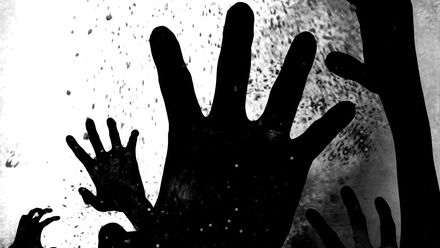|
Dr. Eliza Reilly picked up the doll and scratched at the crust of dried blood on its cheek. Its only remaining eye stared up at her, orb-like, lifeless. Nearby, a dog sunk its teeth into an unidentifiable piece of flesh, consuming it violently, tattered strips of denim and all. She hadn’t meant for any of this to happen. No terrorist’s explosive had littered bone fragments and entrails through the dust-shrouded streets of her little hometown. Mother Nature’s wrath had not moved like a wraith down Main Street, splitting the earth at its fault lines. But, She had split Eliza, imperfectly, asymmetrically, so that the frayed pieces could never again become a whole. Her brother was dead. Eliza wouldn’t stand for it. The stages of death had not landed her wearily upon acceptance. Instead, they festered inside her like an open sore, amalgamating into sickness, into obsession. She had poured every fragment of herself and her profession into taking back what Mother Nature had stolen. When she discovered the fungus, a grotesque little organism that could resurrect, albeit enslave, the corpses of some insects, her line between genius and madness blew away like so much salt. The experiments had taken months. A few reanimated rabbit corpses had given her hope, if only because she’d ignored how they had cannibalized each other only minutes after waking. They were animals, after all. Her brother would be different. Last night, on the anniversary of his death, she’d packed up her syringes and driven to St. Gertrude’s Cemetery. Eliza remembered now, as she stood in the aftermath of her genius, the six feet of packed earth that had stood between her and her brother. The raw blisters on her hands reminded her of the hours she’d spent digging, and of the hollow sound a coffin makes when it’s struck with a rusted shovel. Her brother’s sunken cheeks and shriveled lips, pulled back from his teeth in a ghoulish grin, made it easier to jab the needle into his neck. She might have lost her nerve if only she’d recognized his ornery smile, or the dimple in his right cheek. Eliza held her breath. The fungus blossomed, black and malevolent beneath the mottled skin, and then disappeared. She remembered the sharp crack of stiff tendons as her brother’s fingers flexed one by one. The spores swelled beneath parchment-thin flesh. Black veins crept into his neck and fanned like lightning across his face. She watched in horror as his eyelids cracked open, the deflated eyeballs like salt-shriveled slugs inside his skull. Eliza fell backward against the dirt wall of the grave, a scream lodged in her throat. In twitching, unnatural movements, her brother sat up and fixed his black eyes upon her. “Johnny?” she whispered. The creature opened its mouth as if to answer, the skin on its face cracking and exposing a line of yellow teeth. She buried her face in her hands like a child and listened to it claw its way out of the wound in the earth. By the time she had worked up the courage to follow it, the Jacobs family was dead. She found them on the kitchen floor in their shotgun house, their limbs ripped from their bodies, bits of half-consumed brain matter clinging to dish towels and silverware. Grief suffocated her again, its dark fingers cold around her throat. She knelt beside the remains of the youngest girl and squeezed her severed hand. God, what had she done? The hand squeezed back. The family fell upon her all at once, ravenously seizing fistfuls of her hair, tearing at her skin with jagged fingernails and broken teeth. The girl’s grip tightened until she heard the sick crack of bone, and then the pain came. With a savage cry, Eliza ripped herself from them and stumbled out into the street. Blood poured freely from a wound on her forehead and stained the town scarlet. There were more of them. They were everywhere, emerging from the houses and climbing over wrought iron fences. She recognized the faces of her neighbors and friends, twisted now in pain or hatred, or hunger. Soulless moans escaped their bloodstained mouths, a death rattle beneath a Cheshire cat moon. Eliza ran. Gasping for breath, she burst through the doors of the cemetery’s empty church, folded herself into the space beneath the altar, and prayed. The hope she had clung to all these months faded to a bruise. Her brother was dead, really, truly dead. Even as the tears stained her skin, she wondered at the strange blackness that mercifully infested her grief, mutating it into half-recognized craving. Even her shattered hand ceased to throb. It was easier this way, in the dark. By midnight, half the town had been infected, and by dawn, when she finally emerged from her hiding place, they were all dead. Only the dogs remained. As the fungus crept beneath her skin, one of the dogs lifted its head. Her fingers moved without her consent. The dog sniffed the air, and then it ran.  H.B. Diaz is an internationally published gothic horror writer and HWA member whose short stories have been featured in publications from the likes of Horror Tree, ID Press, Flame Tree Press, and Sirens Call Publications, among others. She lives with her husband and son in a historic (and likely haunted) East Coast town. Follow her on Twitter and her website: www.authorhbdiaz.com/ Comments are closed.
|
Archives
June 2024
Categories
All
|

 RSS Feed
RSS Feed